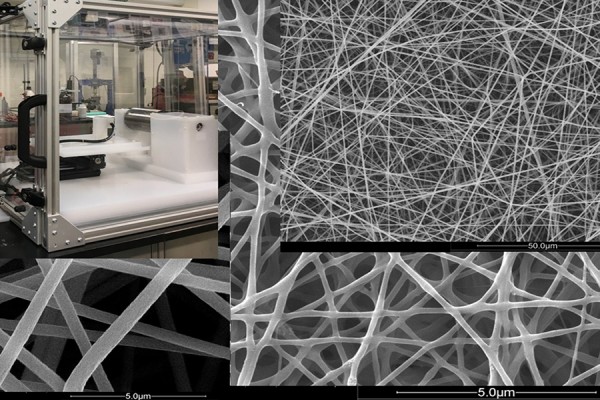 Layers of nano-fibres can produce high-efficiency mask filters, says materials engineering professor Reza Riahl.
Layers of nano-fibres can produce high-efficiency mask filters, says materials engineering professor Reza Riahl.
The rise of the COVID-19 pandemic has exposed a worldwide need for readily accessible, high-grade face masks. A University of Windsor professor of materials engineering aims to mitigate this problem.
“The limited supply of essential protective equipment such as N95 face masks, which have been determined to aid in minimizing the spread of this disease, has proven detrimental to both health professionals and the public,” says Reza Riahi.
He is working with local manufacturers to develop activated nano-fibre layers produced by an electrospinning method, where a high voltage is applied to a polymer solution to produce nano-fibres with a high surface area and surface charges. These layers can be used to fabricate filters that are more effective than N95 masks, Dr. Riahl says.
“By using porous functional nano-fibre layers, we can produce high-efficiency mask filters to block fine particles, including bio-airborne, while minimizing breathing effort,” he says of the material, which can also be used as a filter in home-made masks or as a standalone fabric to make masks.
Riahi has partnered with NanoPhyll Inc. and River Drive Manufacturing on the $50,000 Natural Sciences and Engineering Research Council of Canada (NSERC) funded project. The companies are providing $29,000 of in-kind support.
While many civilians have turned to homemade masks, Riahi says they provide only limited protection for those around and little for the user. Surgical masks, he adds, offer limited protection due to the high particle size penetration provided by its mechanical filters as opposed to the low penetration size offered by N95 masks.
“However, the majority of N95 masks are manufactured outside of Canada,” Riahi says. “The results from this project will be readily transferable to Canadian industries to produce high-efficiency mask filters for protection against COVID-19 for both the users and those around.”
—Kristie Pearce
